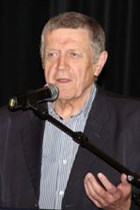
Top stories


Marketing & MediaCammy Msimango on finding her footing in South Africa’s fast-moving digital newsroom
Esther Tomorrow, MDNTV 1 hour




More news








David Ogilvy apparently once said: "The more you tell, the more you sell," but actually, he didn't write this axiom himself - he was quoting Dr Charles M Edwards of the Graduate School of Retailing at New York University who said, in full, "The more facts you tell, the more you sell - an advertisement's chance for success invariably increases as the number of pertinent merchandise facts included in the advertisement increases."
It was Charlie Brower who said, with his typically desert-dry humour, that he was always taught that the reader should never be bored: "If we couldn't be bright, we could at least be brief. Consequently, I can now write a whole book on a single sheet of paper. The trouble is, no-one but me would know it was a book..."
He wasn't the only one concerned with brevity. Bruce Barton, founder of BBDO, was a persistent adversary to long copy and, at one stage, suggested that copywriters be issued with half-sheets of paper. (How he would have loved Twitter!)
A more famous supporter of 'less verbal' was Winston Churchill - the great orator himself - who sent a memo to the Lord of the Admiralty in 1941, which said: "Pray state this day, on the side of a sheet of paper, how the Royal Navy is being adapted to meet the conditions of modern warfare."
But getting back to Ogilvy for a moment. He, of course, wrote the headline (which I've mentioned many times): "At 60 miles an hour, the loudest noise in this new Rolls-Royce comes from the electric clock," and he was mightily proud of it. He even counted the number of words and boldly announced that 500 or more words would sell more product.
Sadly, it didn't. There is no record of any increases in sales and Rolls-Royce was eventually sold.
But he did make a good point about headlines: "On average, five times as many people read the headline as read the body copy. When you have written your headline, you have spent eighty cents out of your dollar."
He persisted in supporting long copy and had a major argument with someone (let's call him Chris Brewer) where he said something like: "I can write a 4,000 word advertisement, set in 8-point type, and I will guarantee that you'll read every word."
Quite a challenge! And one with which most people would disagree. But when he added the headline, his point became crystal clear:
"This advertisement is all about Chris Brewer".
And, of course, that's what each and every one of your customers should think when they read your ad - "this is all about me!"
My one last quote about David Ogilvy concerns something I strongly identify with:
"I don't know the rules of grammar. If you're trying to persuade people to do something, or buy something, it seems to me you should use their language." (And we'll be discussing this aspect in weeks to come).
There are plenty of references made by various advertising celebrities over the years about how many words should be in a headline (the favourite seems to be a maximum of 13) and how long the copy should be - but, in fact, nobody really has ever known for sure.
But simple logic dictates that the copy in an advertisement should be long enough.
It's true. And next week I'll be giving you the top 20 rules of copywriting.
Read my blog (brewersdroop.co.za) or see what other amazing things we do at brewers.co.za
*Note that Bizcommunity staff and management do not necessarily share the views of its contributors - the opinions and statements expressed herein are solely those of the author.*
